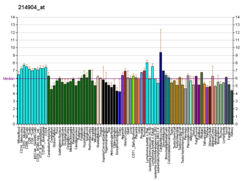Zinc finger protein 41 is a protein that in humans is encoded by the ZNF41 gene.[3][4]
This gene product is a likely zinc finger family transcription factor. It contains KRAB-A and KRAB-B domains that act as transcriptional repressors in related proteins, and multiple zinc finger DNA binding motifs and finger linking regions characteristic of the Kruppel family. This gene is part of a gene cluster on chromosome Xp11.23. Several alternatively spliced transcript variants have been described, however, the full-length nature of only some of them is known.[4]
References
edit- ^ a b c GRCh38: Ensembl release 89: ENSG00000147124 – Ensembl, May 2017
- ^ "Human PubMed Reference:". National Center for Biotechnology Information, U.S. National Library of Medicine.
- ^ Franze A, Archidiacono N, Rocchi M, Marino M, Grimaldi G (Jul 1991). "Isolation and expression analysis of a human zinc finger gene (ZNF41) located on the short arm of the X chromosome". Genomics. 9 (4): 728–36. doi:10.1016/0888-7543(91)90367-N. PMID 2037297.
- ^ a b "Entrez Gene: ZNF41 zinc finger protein 41".
Further reading
edit- Rosati M, Marino M, Franzè A, et al. (1991). "Members of the zinc finger protein gene family sharing a conserved N-terminal module". Nucleic Acids Res. 19 (20): 5661–7. doi:10.1093/nar/19.20.5661. PMC 328972. PMID 1945843.
- Knight JC, Grimaldi G, Thiesen HJ, et al. (1994). "Clustered organization of Krüppel zinc-finger genes at Xp11.23, flanking a translocation breakpoint at OATL1: a physical map with locus assignments for ZNF21, ZNF41, ZNF81, and ELK1". Genomics. 21 (1): 180–7. doi:10.1006/geno.1994.1240. PMID 8088786.
- Rosati M, Franzé A, Matarazzo MR, Grimaldi G (1999). "Coding region intron/exon organization, alternative splicing, and X-chromosome inactivation of the KRAB/FPB-domain-containing human zinc finger gene ZNF41". Cytogenet. Cell Genet. 85 (3–4): 291–6. doi:10.1159/000015315. PMID 10449920. S2CID 26777065.
- Strausberg RL, Feingold EA, Grouse LH, et al. (2003). "Generation and initial analysis of more than 15,000 full-length human and mouse cDNA sequences". Proc. Natl. Acad. Sci. U.S.A. 99 (26): 16899–903. Bibcode:2002PNAS...9916899M. doi:10.1073/pnas.242603899. PMC 139241. PMID 12477932.
- Shoichet SA, Hoffmann K, Menzel C, et al. (2004). "Mutations in the ZNF41 gene are associated with cognitive deficits: identification of a new candidate for X-linked mental retardation". Am. J. Hum. Genet. 73 (6): 1341–54. doi:10.1086/380309. PMC 1180399. PMID 14628291.
- Colland F, Jacq X, Trouplin V, et al. (2004). "Functional proteomics mapping of a human signaling pathway". Genome Res. 14 (7): 1324–32. doi:10.1101/gr.2334104. PMC 442148. PMID 15231748.
- Gerhard DS, Wagner L, Feingold EA, et al. (2004). "The status, quality, and expansion of the NIH full-length cDNA project: the Mammalian Gene Collection (MGC)". Genome Res. 14 (10B): 2121–7. doi:10.1101/gr.2596504. PMC 528928. PMID 15489334.
- Ross MT, Grafham DV, Coffey AJ, et al. (2005). "The DNA sequence of the human X chromosome". Nature. 434 (7031): 325–37. Bibcode:2005Natur.434..325R. doi:10.1038/nature03440. PMC 2665286. PMID 15772651.
External links
edit- ZNF41+protein,+human at the U.S. National Library of Medicine Medical Subject Headings (MeSH)
This article incorporates text from the United States National Library of Medicine, which is in the public domain.


